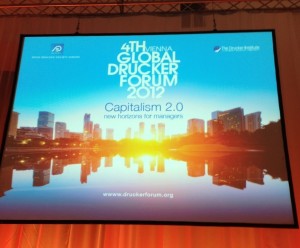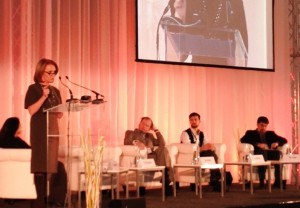CEO Vicki Escarra Checks in from 2012 Peter Drucker Forum in Vienna
This is an inspiring week as I attended the fourth annual Global Peter Drucker Forum in Vienna, Austria, where several hundred leaders from the corporate, academic and NGO settings gathered to explore the future of management and its impact on the future of global society. Peter F. Drucker was a management consultant, educator, author and contributor to the philosophical and practical foundations of modern business whose name graces two institutions at Claremont Graduate University in California: The Drucker Institute, which was the Forum’s host; and the Peter F. Drucker and Masatoshi Ito Graduate School of Management. Not everyone agreed with Drucker’s philosophy, but there is no doubt that many of the principles he strongly advocated for, and built business education programs and practices around, are very relevant to the work of non-profit organizations, including Opportunity International.
 Included in the Forum’s introductory session on Thursday morning was a video greeting from the 101-year-old Doris Drucker, Peter’s wife and Board Member of the Drucker Institute. In the video, Doris sharpened the focus on our growing global population, our sense of cooperation versus competition, the education of our children and the use of GPS technology in planting trees. All this from a woman of her age was quite a way to begin this conference.
Included in the Forum’s introductory session on Thursday morning was a video greeting from the 101-year-old Doris Drucker, Peter’s wife and Board Member of the Drucker Institute. In the video, Doris sharpened the focus on our growing global population, our sense of cooperation versus competition, the education of our children and the use of GPS technology in planting trees. All this from a woman of her age was quite a way to begin this conference.
What I heard here is that there is great commonality between the private sector and what Opportunity International does. Our management, development and advancements in the ways in which we do business don’t differ all that much. We share common problems and opportunities. I think of it not only in terms of how we work, but in terms of our synergy with companies we work with now and those we hope to work with in the future. The partnerships have to succeed, and understanding the underlying motivations for all groups involved is something that is very apparent at this conference.
 On Friday morning, I gave remarks to the Forum’s delegates from 33 nations and I could not help but reflect on a few of Drucker’s fundamental principles cited yesterday that ring very true in terms of organizational principles:
On Friday morning, I gave remarks to the Forum’s delegates from 33 nations and I could not help but reflect on a few of Drucker’s fundamental principles cited yesterday that ring very true in terms of organizational principles:
- The customer comes first. For us, this means Opportunity clients. The benefits our clients derive are transformative. That is our goal.
- Smart business requires integrated solutions. This is what Opportunity International does. Loans, access to savings, insurance and training are all included in the services we offer to our clients. This provides them with the tools they need to make those personal and community-based transformations happen.
- Seek sustainability. Consider the impact of business on society. Some would say that the Opportunity model is a business one. We know that through Opportunity, a $1 investment is leveraged, having a $6 impact over five years. Working capital is really working!
- Force positive sum games versus zero sum games. Building value is what we’re doing around our agriculture, technology and education initiatives. We’re taking money that’s been working for more than 40 years and forcing a positive sum game in which opportunity perpetuates more opportunity.
Something else that was a big topic and stuck with me is also a pillar for Opportunity International. This was: education as a fundamental right. Kids need to be in school and societies need to ensure that this happens. We know that better education creates stronger chances for success and there can’t be barriers to making sure our children are educated.
Finally — and this is very important — with anything we do, if we find that something is not working as it should, we need to address it and correct it. Often, this takes time. But if we are able to make simple tweaks to correct how we are delivering all of these wonderful products and services to our clients when we see the need to, we are able to more quickly enable the change that our clients deserve. They do, after all, come first.